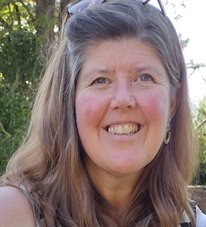Sheona Goodyear
Understanding UK women's primary school experiences after experiencing child sexual abuse from an adult male in the family context
This interpretive research has evolved through encounters with different ways of knowing and different ways of discovering the essence of living experiences. I draw on phenomenology and ethnography underpinned by heuristic inquiry to enrich the investigation.
From a trauma responsive and relational ethic of care, women survivors of sexual abuse by an adult male within the family environment are invited to share memories of attending primary school and to make meaning from them. Through the initial proposal, design and execution, this research uses a best practice model of participation proposed by Chevous, Perôt and Kennedy (2019). Research conversations approached heuristically are combined with autoethnography to unlock and illustrate the essence of women survivors' living experiences. These iterative cycles of data collection, interpretation and analysis enable a depth of rich, nuanced insight and synthesis to emerge.
Findings will be widely shared to disrupt barriers to disclosure and aid educators’ efforts in child protection. A final aspiration is to generate conversation: to challenge secrecy, stigma and shame which marginalise sexual abuse victims and survivors and encourage practitioners to take away the message ‘it could happen here’ (DfE, 2024, p.111).
Supervisors: Mr Neil Hall, Dr Sophie King-Hill
Sheona's research investigates inclusive and trauma-informed practice in education; identification of barriers to attainment and well-being and facilitation of timely support, to reduce cumulative, life-long effects and enable preventative action. She is interested in interpretive methodology and ethical application of narrative inquiry and autoethnography in research. Her teaching background is in primary and further education, management of inclusion and support for learning and she is a Dyslexia Specialist qualified to conduct diagnostic assessments
- MEd Inclusion and Special Needs, University of Birmingham
- Level 7 Diploma in Teaching and Assessing Learners with Dyslexia/Specific Learning Difficulties, Hereford and Ludlow College: Assessment Practicing Certificate, Patoss
- Level 5 Diploma in Teaching Adult Literacy, Worcester University
- Postgraduate Certificate in Education, Early Years, Worcester College of Higher Education
- BA(Hons) Ceramics, Middlesex Polytechnic
- Adverse childhood experience
- Neurodiversity
- Trauma informed practice
- Recognising alternative knowledges
- Innovative qualitative research methods
Teaching responsibilities
Post Graduate Teaching Assistant for Academic Skills Centre, University of Birmingham. Professional Practice Tutor, Access Arrangements Assessment, Professional Association of Teachers of Students with Specific Learning Difficulties (Patoss)
Goodyear, S. (2024) 'Exploring the value of vocational further education in horticulture for neurodiverse students', Good Autism Practice (GAP), 25(1), pp. 42-48.